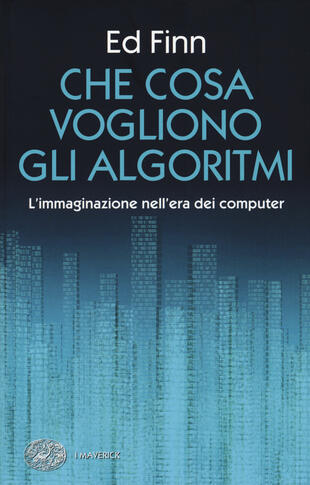

Sinossi
Gli algoritmi ci aiutano a percorrere le strade delle città, a scegliere un libro o un film, forniscono una risposta a ogni nostro bisogno. Crediamo in essi come in una formula taumaturgica in grado di svelare ciò che dobbiamo sapere e ciò che vogliamo. Ed Finn sottolinea come l'algoritmo - ovvero «un metodo per risolvere un problema» - affondi le sue radici non solo nella logica matematica, ma anche nella cibernetica, nella filosofia e nel pensiero magico. Gli algoritmi dunque non solo descrivono il mondo, ma lo creano, riorganizzando la caotica realtà quotidiana con risultati imprevedibili, inquietanti e talvolta affascinanti. Spaziando da "Snow Crash" di Neal Stephenson all'"Encyclopédie" di Diderot, da Adam Smith al computer di Star Trek, l'autore esplora il divario tra orizzonte teorico ed effetti pratici, esamina lo sviluppo degli assistenti intelligenti come Siri, l'estetica algoritmica di Netflix, il gioco satirico virtuale Cow Clicker, la rivoluzionaria economia dei bitcoin, l'obiettivo di Google di anticipare ogni nostra esigenza e intenzione, le mappe di Uber, la crescita esponenziale di Facebook e molto altro ancora. Senza mai demonizzare né divinizzare quelli che sono diventati gli autentici, spesso tirannici, protagonisti delle nostre vite, Finn auspica un modello di «lettura algoritmica» della realtà in grado di dare vita a delle vere e proprie scienze umane sperimentali.
- ISBN:
- Casa Editrice:
- Pagine: 236
- Data di uscita: 17-04-2018
Recensioni
I honestly don't know what to think of this book. It is erudite, fascinating, flawed and sloppy. It brings up many important issues, but seems unable to resist a clever line in the place of a precise one. It is a mile wide, and an inch deep, usually moving on instead diving deep. It is careless of f Leggi tutto
The science fiction author Neal Stephenson comments on the cover of this book that it is 'highly enjoyable'. I suspect this is because in the opening of the book, Ed Finn repeatedly refers to Stephenson's impressive novel Snow Crash. If Stephenson actually found reading What Algorithms Want to be fu Leggi tutto
Um livro denso e bastante –às vezes reflexivo e vago demais– sobre o papel crescente dos algoritmos em nossa vida. Como as empresas estão migrando para serem grandes algoritmos: de logística (Amazon, UPS), entendimento de dados (Google), conexão (Facebook), transporte e transação financeira (Uber), Leggi tutto
Twice I read (that is, listened) to this book, because I thought, the first time, that there must have been something more to it. Pretty much there wasn't. The Bad: * constant puddles and swamps of art-wank, intellectual-wank writing that often isn't even correct, only obscure. * excessive reference Leggi tutto
A superb clarification not just of how and why algorithms came to play such a central role in the organization of our world, but also of the cultural, theoretical and philosophical transformations this new era has ushered in. Shows once again that the age of algorithms requires humanities perspectiv Leggi tutto
No lo leí entero, porque era innecesariamente denso. El lenguaje académico intrincadísimo hacía las ideas incomprensibles. Sin embargo, me aportó citas y alguna que otra idea interesante. Los capítulos que me interesaron fueron el que iba sobre Siri y el de Netflix y el cine algoritmo.
Enjoyable book on cultural influences of algorithms (in the broad sense), covering examples from Netflix, DeepMind, “Thinking tools” like Memex and Star Trek’s computer, the movie “Her” and Bitcoin. It was well readable, particularly since many treatments of algorithms from the social sciences have Leggi tutto
Citazioni
Al momento non ci sono citazioni, inserisci tu la prima!























